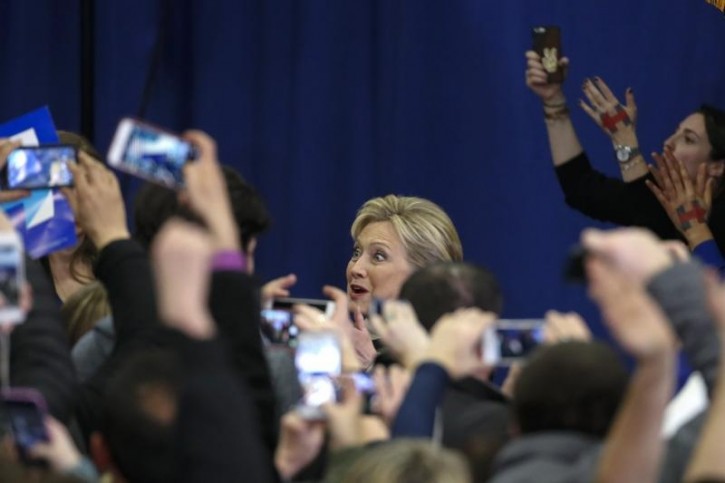
Washington – Hillary Clinton’s campaign has spent months fighting the perception that she has a shaky relationship with the truth and is disconnected from the problems facing Americans.
So far, the campaign’s effort hasn’t worked.
Less than half the voters in New Hampshire’s Democratic primary found Clinton to be honest and trustworthy, while about 90 percent believed those qualities fit her rival, Bernie Sanders. Equally concerning for Clinton as she grapples with her double-digit loss to Sanders in New Hampshire: Voters who wanted a presidential candidate who cares about people like them sided overwhelmingly with the Vermont senator, an empathy gap that has proved devastating for previous presidential candidates.
The numbers echoed voter surveys last week in Iowa, where Clinton edged Sanders by the narrowest of margins.
“This is a serious, serious problem that is clearly afflicting her,” said Paul Maslin, a Democratic pollster. “It’s not just Bernie Sanders and the strength of his message or that she’s cast as the establishment. It’s a personal judgment that people have made about her.”
Clinton advisers say they’re clear-eyed about the problems posed by the public’s perception of their candidate. But they’re less certain about how to address them.
In classic Clinton fashion, allies have floated the prospect of a staff shake-up at her Brooklyn campaign headquarters. While no one on the senior team is expected to be fired, the Clintons are said to be eyeing a role for a senior Democrat who could serve as a singular decision-maker, an implicit indictment of an organization where decisions often seem to be made by committee.
But shifting staff roles alone won’t change how Clinton is viewed by voters, Democrats friendly to the campaign say. Allies see a candidate still dogged by a slow, tortured response to criticism of her use of personal email and a private Internet server while at the State Department. And they also worry she’s reinforcing the public’s negative perceptions by stumbling through explanations of why she accepted high-dollar speaking fees from Wall Street banks — and refusing to release transcripts from those private appearances.
South Carolina state Rep. Todd Rutherford, a Clinton supporter, said that in an election where voters are drawn to Sanders’ passionate calls for ending Wall Street’s influence in Washington, Clinton has a “difficult needle to thread” when it comes to explaining her history of campaign contributions and speaking fees from the financial industry.
Indeed, voters have raised those concerns repeatedly in early voting states.
“Someone gives you money, you owe them,” said Francis Neddo, 64-year-old Sanders supporter from Londonderry, New Hampshire. “You don’t get money from them next time unless you pay off.”
Daniel Harty, a 21-year-old college student from Nevada, said Clinton seems dismissive of what he called “real problems,” particularly with her email use.
“It’s not something she should be laughing off,” he said.
Clinton often blames such perceptions on what she sees as well-funded Republican efforts to impugn her character — rhetoric that harkens back to her 1990s assertion that a “vast, right-wing conspiracy” was trying to take down her husband, President Bill Clinton.
“At this point it’s probably not correct to say it’s a conspiracy because it’s out in the open,” Clinton said earlier this month. “It’s real, and we’re going to beat it.”
Beyond the questions of honesty and trust, Clinton aides are concerned that voters don’t see her as empathetic to their problems.
During the 2012 general election, Republican Mitt Romney was viewed as a strong leader and well-qualified to manage the economy. But his advisers said he lost in part because he lagged so far behind President Barack Obama when voters were asked which candidate seemed to care more about their problems.
Clinton’s team tried to infuse her campaign with empathy during its early months, often putting the candidate in smaller settings that were supposed to convey that she was eager to learn about voters’ problems. But even as she diligently took notes on legal pads and asked probing questions about personal finances, the conversations often felt stilted and contrived.
In recent weeks, Clinton has tried to connect by adopting some of Sanders’ vigorous anti-Wall Street message, casting herself as a fighter for the middle class who won’t be afraid to take on the big banks. But compared to Sanders’ almost singular focus on this issue throughout his political career, Clinton has come across as late to the game.
Her campaign hinted at another message revamp in the hours after polls closed in New Hampshire. With an eye toward the more racially diverse states that vote next in the primary calendar, Clinton detailed her work on social justice issues, ticking through her years working at the Children’s Defense Fund and pledging to “break through the barrier of bigotry” that affect minorities.
“That is who I am,” she said.
As reported by Vos Iz Neias
